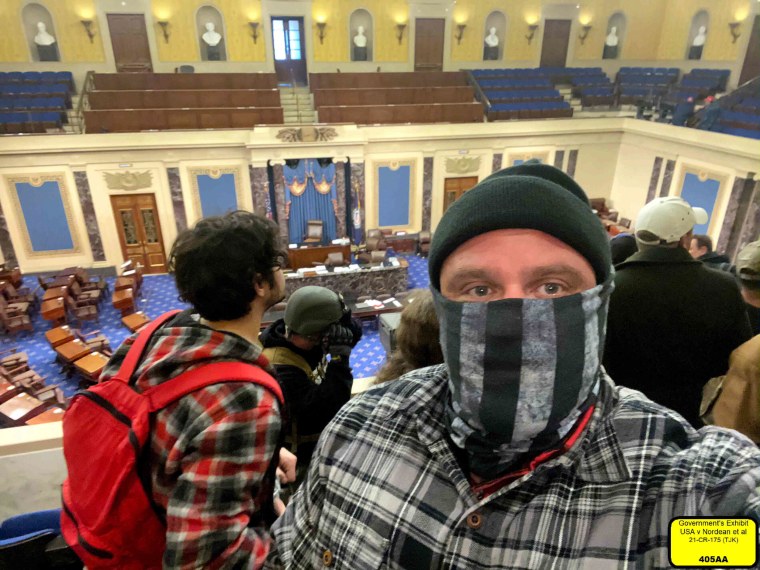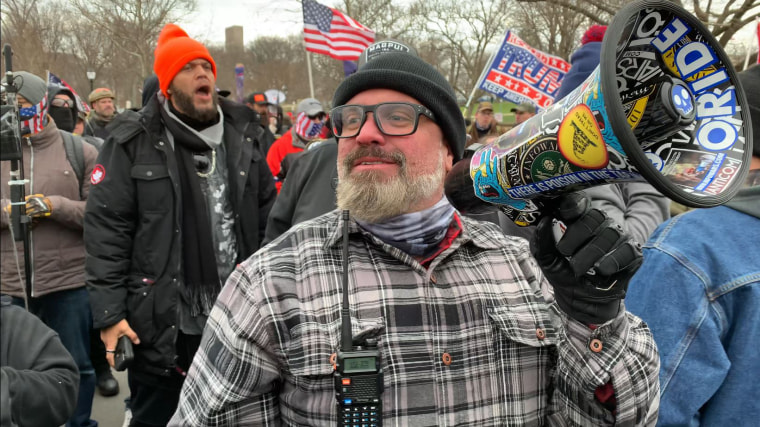WASHINGTON — Joe Biggs, a Proud Boys leader convicted of seditious conspiracy who the government says "served as an instigator and leader" during the Jan. 6 attack on the U.S. Capitol, was sentenced to 17 years in federal prison Thursday.
It is among the longest sentences in Capitol riot cases. The record is the 18-year sentence given to Oath Keepers founder Stewart Rhodes, also convicted of seditious conspiracy, after prosecutors sought 25 years in federal prison.
The government sought 33 years for Biggs, an Army veteran who sustained a head injury in Iraq and then was a correspondent for the conspiracy website Infowars. Prosecutors argued that he was a “vocal leader and influential proponent of the group’s shift toward political violence” and that he used his “outsized public profile” and his military experience as he “led a revolt against the government in an effort to stop the peaceful transfer of power.”
U.S. District Judge Timothy Kelly, who handed down Biggs' sentence, ruled earlier in the hearing that Biggs’ tearing down of a fence between police and rioters qualified him for a terrorism sentencing enhancement sought by prosecutors. Destroying the fence was a “deliberate, meaningful step” that contributed to the disruption of the electoral vote count occurring in the Capitol, Kelly said.

Biggs was convicted in May of seditious conspiracy; conspiracy to obstruct an official proceeding; obstruction of an official proceeding; conspiracy to use force, intimidation or threats to prevent officers of the U.S. from discharging their duties; interference with law enforcement during civil disorder; and destruction of government property.
Biggs went to trial alongside Enrique Tarrio, Ethan Nordean, Zachary Rehl and Dominic Pezzola. All five were convicted of felonies, and all but Pezzola were convicted of seditious conspiracy. The other Proud Boys were also to be sentenced in the coming days: Rehl on Thursday afternoon, Pezzola and Nordean on Friday and Tarrio on Tuesday.
Kelly sentenced Rehl later Thursday afternoon to 15 years in federal prison. Prosecutors had sought 30 years. “You did spray that officer, and then you lied about it,” Kelly told Rehl. “Those are what we call in the law bad facts.”
In a selfie video he recorded outside the Capitol on Jan. 6, 2021, Biggs said, “January 6th will be a day in infamy.”
Norm Pattis, an attorney for Biggs, said in closing arguments at trial that the Proud Boys' "commander-in-chief" — former President Donald Trump — "sold them a lie," referring to the lies about the 2020 presidential election.
Before his sentence was handed down Thursday, he said that he was sorry and that he knew he "messed up" on Jan. 6.
“I apologize for my rhetoric,” Biggs said, adding that he used it as a way to deal with what was going on with his family after a member of their family molested his daughter. “I’m so sorry. ... I’m not a terrorist. I don’t have hate in my heart.”
Biggs grew emotional as he talked about his daughter, swearing on her life that he intended Jan. 6 to be his last event with the Proud Boys.
“I’m done with it. I’m sick and tired of left versus right,” Biggs said. The only group he wants to be affiliated with, he said, is his daughter’s PTA.

During the government’s presentation earlier in the hearing, Assistant U.S. Attorney Jason McCullough stressed the seriousness of the Proud Boys’ actions on Jan. 6, calling them “among the most serious crimes that this court will consider.”
“There’s a reason why we will hold our collective breath as we approach future elections,” McCullough said. “We never gave it a second thought before Jan. 6.”
After Jan. 6, Americans will think twice about taking children to polling places or attending events like inaugurations, which was what the Proud Boys intended, McCullough said.
Pattis, Biggs’ lawyer, conceded that his client committed some crimes on Jan. 6 but said they had been “overstated.”
The actions of the Proud Boys on Jan. 6 were “quintessential political behavior” up until the riot turned violent, Pattis said, arguing that prosecutors had used his client’s political speech as evidence of criminal intent.
“We have to be careful to count speech for what it is and not what it might do,” he said.
“To treat these men as terrorists would be, in my view, the functional equivalent as the destruction of Waco,” Pattis said, referring to the law enforcement siege of the Branch Davidian compound in Waco, Texas, in 1993.
Despite applying the terrorism enhancement to Biggs, Kelly agreed that enhancement “overstates” Biggs’ conduct.
“It’s not my job to label you a terrorist, and my sentence today won’t do that, no matter what it is,” he told Biggs before he delivered the sentence.
“What happened on Jan. 6 harmed an important American custom that helps support the rule of law and the Constitution,” he said. “That day broke our tradition of peacefully transferring power, which is among the most precious things that we had as Americans. Notice I said 'had.' We don’t have it anymore."
